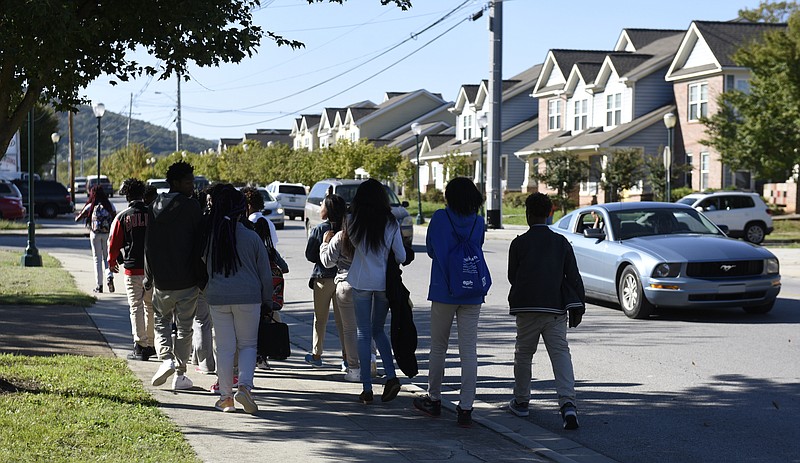Remember the crime drama "Catch Me If You Can?" Leonardo DiCaprio played a real-life check forger so adept and expert that, when the FBI finally caught him, they didn't lock him away, but rather made him one of their own.
It made perfect sense: to understand the minds of forgers, you have a forger on your side.
The same is true for the streets.
Urban violence is a maze of complexities, subtleties, codes and shibboleths, as much psychological as physical. You can't arrest your way into or out of it; policies, written from afar, often don't translate.
Therefore, to understand the complicated mentality of the streets, you need a man of the streets on your side.
A man from the very streets you are trying to change. A man respected and welcome in turfs across the city.
A man who can try to interrupt the violence, talk in the language of de-escalation and even change mindsets, not with force, but humility and understanding.
Such a man? He'd be worth so much to our city, right?
"I want to help," said one man last week.
His name is Joe Robinson.
They call him "Money."
He could be worth an immeasurable amount in helping reducing violence here.
Born in Chattanooga in 1984 and nicknamed "Money" by his grandmother - "I was her first grandchild," he said, "so she spent all her money on me" - Joe grew up living, visiting and staying in different neighborhoods, from Alton Park to Boone Heights, which set into motion two hallmarks of his life.
He is able to transcend geography and turf because he knows so many people across the city.
And he has a deep understanding that people in Alton Park want the same thing as people in the Woodlawns. Or East Lake. Or the Westside. Or Avondale.
"I'm real," he said. "I don't care what side of town you're on. I talk to you like a man."
Joe has a dynamic blend of people skills and physical power; he could talk to the mayor just as easily as he could a gangbanger. Built like a fireplug, he is massively strong. He's a fighter, and a statesman of sorts.
At Howard School, he was a freshman quarterback leading upperclassmen from different neighborhoods. (Diplomacy.) He tells stories about stopping bullies. (Moral rightness. Courage.) Received the principal's award at Calvin Donaldson Elementary. (Intelligence.) Stopped folks from shooting up his aunt's house. (Courage, again.)
Most nights, he works security at a nightclub, which means he has to keep the peace between different sets and gang leaders, all of whom come to the club to drink, play cards, and so on.
They know him. They respect him.
And respect is a prized currency of the streets.
"You've got to be known to have a voice," he said.
I asked Joe to list the neighborhoods he could drive to - right now - and talk with folks about de-escalation and violence reduction.
He paused.
"All of them," he said.
How many people in this city can say that? This is not boasting or cowboy braggadocio. Joe's not being disrespectful.
It's his way of saying he wants to help.
"I feel like I can help groom this next generation," he said. "Every man needs a man in their life."
In gang policy parlance, Joe "Money" Robinson is what's called a violence interrupter. It makes perfect sense: the ones able to reduce and interrupt street violence are the ones who are most familiar with it.
Joe isn't affiliated. He rolls up his sleeves: "See," he says. "No tattoos." He has no record.
Yet he has come up out of the streets. He knows the violence. (Family and friends shot, imprisoned.) Knows the pain. (Roaches in the cereal box. Hustling just to survive.) Knows what's at stake. (He's a father of four.)
Defined by Dr. Gary Slutkin in Chicago, violence interrupters are the peacemakers of the street. If violence is a contagion, they are the antibodies. They are the embodiment of the belief that within the problem can be found the cure. Trusted and respected, they can talk to and influence gangbangers in a way no one from City Hall or a police station can.
A few years ago, the city and Boyd Patterson, then-director of the Gang Task Force, had funded and trained three violence interrupters.
Then came a new administration.
As shootings explode across the city, and the effectiveness of the Violence Reduction Initiative is questioned, is it time to reconsider this idea?
"I'm part of this generation," said Joe. "I know how they think. Government folks can never be in our shoes and feel our pain.
"If we don't deal with a person's mind, we ain't ever going to get nowhere."
Contact David Cook at dcook@timesfreepress.com or 423-757-6329. Follow him on Facebook at DavidCookTFP.


